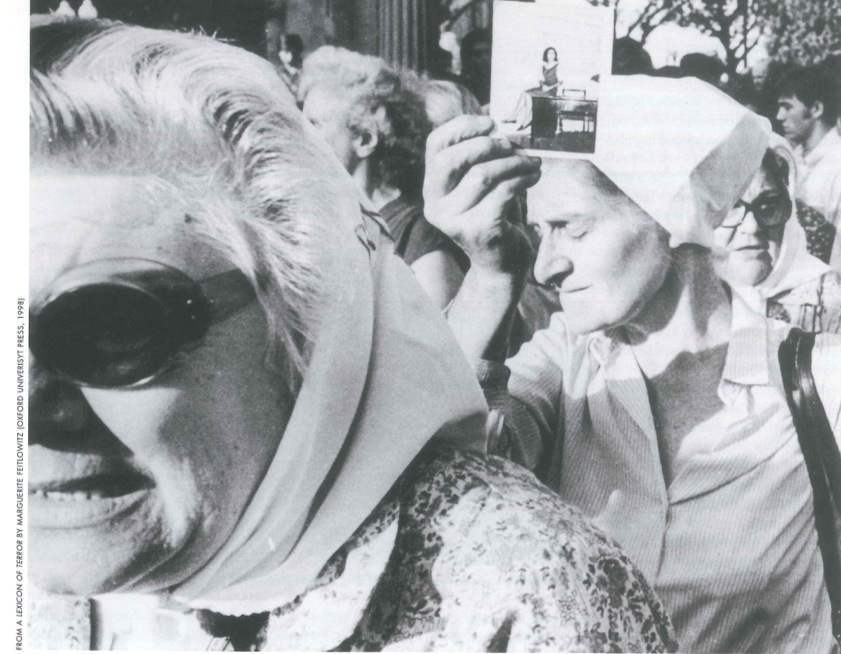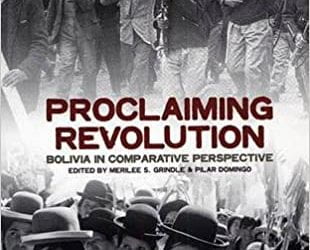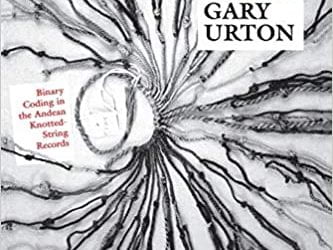Reclaiming the Disappeared
An Argentine Human Rights Saga

Relatives of the disappeared protest in Argentina.
The four women sat blindfolded and bound in the clandestine prison in La Plata, Argentina. Only one lived to tell the story. And her story, a reflection of the dark time of the 1980s Argentine dictatorship, was one U.S. journalist Margaret Grammer Vallejos was determined to tell. The American public needed to hear the emotionally powerful experiences of these women kidnapped in 1977 that the Argentine junta in its ‘Dirty War’ against subversion had attempted to silence forever.
And then Grammer, a 35-year-old single mother and ABC radio correspondent in Buenos Aires during the trial of the generals, was herself killed in a 1989 car crash. Again there was silence. But not for long. Her mother Virginia Grammer finished the writing, using the reporter’s hundreds of hours of interviews and trial reporting. Family members and a friend edited and polished the manuscript. The book is finally complete. It weaves together the complex stories of four women in a compelling manuscript, The Return of the Disappeared:
With no diversions, the women in deepening conversation built a community. They discussed almost everything, first from one side, then another, elaborating with normally insignificant detail—the style of the clothing, the texture of the sand at the beach, the aroma of the hot pudding. Sightless, they enriched their existence with their memories. Color, light, sound, and odor took on new importance.
Their most time-consuming significant activity was preparation for the possibility that one might be released and be able to take word to the families of the rest. They performed a ritual memorizing how to make contact with each other’s families.
Seated in a circle, each woman recited her strategy, pointing to another to repeat it. One might be represented by a phone number, a second by an address or the position of her father’s name in the phone book. The ritual continued for hours at a time and gradually evolved into a strict memory exercise as recollection improved. They knew they must be prepared to send news out; they had no advance notice of transfers.
Return of the Disappeared vividly depicts real situations and real people in the compelling genre of literary journalism, combining memoir, court drama, documentary and human rights saga.
On the eve of the Argentine Supreme Court’s declaring unconstitutional the laws that gave amnesty to the perpetrators of the Dirty War, Return of the Disappeared forcefully reminds us of the real people whose lives and whose families those atrocities forever altered. This is a story that needs to be told.
Fall 2003, Volume III, Number 1
Elizabeth Marshall, the deceased journalist’s sister, would welcome advice on getting the manuscript published. Please contact her at elmarshl@ix.netcom.com.
Related Articles
Proclaiming Revolution
In April of 1952, Bolivia, an obscure, landlocked, country with a mining economy and an impoverished indigenous majority in the heart of South America jumped to the front pages of…
Poéticas del flujo
osé Antonio Mazzotti, in his second book, Poéticas del flujo. Migración y violencia verbales, identifies the different trends in 1980s Peruvian poetry. With characteristic flexibility and a wide…
Signs of the Inka Khipu
How people know things is as important for study as is what they know. Facts do not exist without a system of thought. How facts become facts, the basic units of knowledge, is crucial to…




